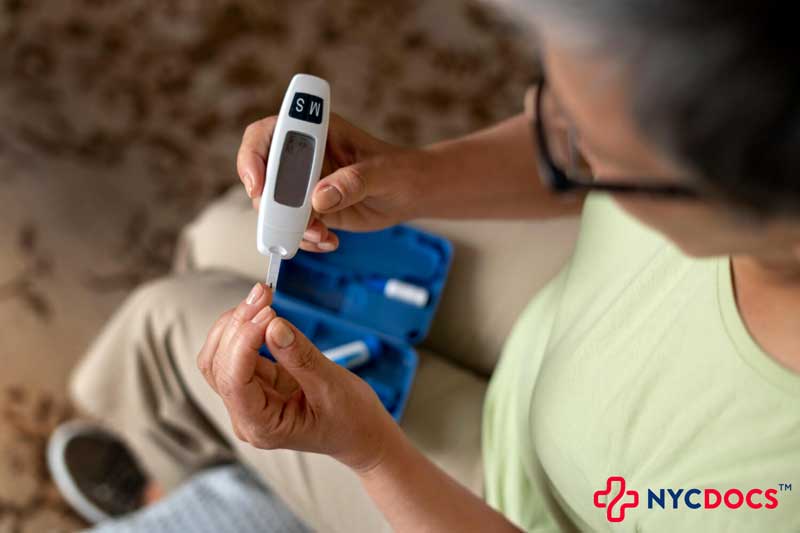Learn all about Prediabetes and how primary care can manage this condition to prevent diabetes.

Prediabetes is one of the common health issues. It is a condition where the blood sugar levels of a person are higher than the normal range. However, it is not high enough to be considered as type 2 diabetes. It is a silent medical condition. You may not feel any symptoms. It can cause several health issues if not untreated. Including obesity, high blood pressure, high cholesterol, heart disease, kidney disease, and even stroke. You must take care of this illness to prevent Type 2 diabetes.
Dr. Ataul H Chowdhury, MD is our experienced internal medicine doctor. He will discuss prediabetes in this blog. He will help you recognize the risk factors. See how primary care providers can manage this condition.
Symptoms of Prediabetes
People normally do not feel any symptoms. However, you may get dark patches on your skin. It occurs in the neck, armpit, or groin.
Risk Factors of Prediabetes
There are several risk factors for this condition:
Diet
Red meat and processed meat are one of the risk factors. Sweetened beverages are known also for it’s higher risk. So people who have this food in their diet on a regular basis have a high risk of getting prediabetics.
Weight
Are you overweight? Then you need to stay careful about this condition. Obesity is a major risk factor that indicates that you may have high blood sugar. Why is that? It is due to the fat deposition between your muscles and skin in the abdomen areas. It makes your cells resistant to insulin. Your body cannot absorb sugar and it stays in your blood.
Age
You can have prediabetes at any age. The risk of developing this condition increases usually after 35 years.
Family History
Your parents or siblings can have Type 2 diabetes. You have the risk of developing it too. You will become prediabetic first and then it will progress into type 2. But don’t worry. It is just a risk factor. It is not guaranteed that you will definitely have this condition. You just need to be cautious about your health.
Smoking Habit
Do you smoke? It can increase your blood sugar level also. Individuals who smoke are more likely to get diabetes. They can also have various other health complications.
Sleep
People with obstructive sleep apnea have a high risk also. You may have this condition if you have disturbed sleep for a long time. Your choice of food and exercise routine can also have an impact on its formation.
Diabetes in Pregnancy
Did you have diabetes before your delivery? You and your child have the risk of becoming prediabetic. You need to be careful about this condition from the early stages. You can have diabetes eventually.
Polycystic Ovary Syndrome (PCOS)
PCOS can cause your blood sugar to increase. This usually happens because of your obesity. Your chance of having prediabetes also increases.
Physical Inactivity
Physical inactivity is a high risk factor. People who do not regularly exercise can suffer. They are more likely to develop insulin resistance and gain weight.
High Blood Pressure
People with high blood pressure are at risk too. They have an increased chance of having this condition and developing type 2 diabetes.
Complication of Prediabetes
Prediabetes has been linked with long-term health issues if not controlled. It can also linked to silent heart attacks. It can progress to type 2 diabetes which can lead to
- High blood pressure
- High cholesterol
- Heart disease
- Chronic Kidney Disease
- Nerve damage
- Eye damage
- Stroke
- Foot Complications
- Skin Diseases
Role of Primary Care in Prediabetes Management
Here’s how we can help you with prediabetes management:
Early Detection and Diagnosis
We can help you identify prediabetes through routine screenings and medical history evaluations. We will tell you to do different laboratory tests for diagnosis as well. Such as fasting plasma glucose test, oral glucose tolerance test and hemoglobin A1c test. You can prevent developing this condition if you continue your routine checkup at an early age. You can also delay its progress through early detection even if you have developed it.
Lifestyle Modification
We make you aware of your condition. It can help you make informed decisions about your health. We let you know about the risk factors and consequences you have to face if this condition becomes serious. We also suggest lifestyle modifications to manage prediabetes effectively. Such as:
Dietary Changes: We make sure you know what you should eat and what items you should avoid. We also educate you on portion sizes based on your body's needs. You should avoid
Physical Activity: We encourage you to do physical movements. We assess your overall health condition to refer you to the types of exercise you can try to manage blood sugar levels.
Weight Management: We guide you to achieve and maintain your body mass index. We recommend you diet plan, exercise routine, medicine and other interventions to bring your weight to the healthy range.
Medical Interventions & Follow ups
We prescribe you medications too. We do this to control your sugar level when your lifestyle changes are not very effective. We assign you followup appointments to monitor your progress. We measure the effectiveness of our treatment plan and make necessary adjustments if necessary.
Schedule your Appointment
NYCDocs is a renowned primary care provider in Bronx. We offer personalized diabetes management to help you maintain your wellness. Our certified physicians conduct your thorough assessment and provide the best care. We have female internal medicine doctors to ensure the comfort of our female patients. Our team has Spanish speaking doctors also. It ensures smooth communication with our Spanish speaking patients. We offer online, walk-in and telehealth appointments for your convenience. Book your appointment today
FAQ
Can prediabetes be reversed?
Yes, people can reverse prediabetes by making changes in lifestyle. These include:
- Eat a diet rich in fruits, vegetables, and low-fat dairy products
- Limit carbs and portion sizes at meal
- Aim for at least 30 minutes of physical activity per day
- Limit your sweets and sugary beverages
- Losing excess weight
- Controlling your blood pressure and cholesterol
- Not smoking
How frequently should I get screened?
We advise screening every one to three years from age 35 who are overweight or obese. Your PCP may recommend more frequent screenings based on your risk factors.
Can I manage prediabetes without medication?
People can manage their condition through lifestyle changes alone. You can follow a healthy diet with less sugar and red meat. You can exercise regularly. Many times changes in lifestyle are not enough to control blood sugar levels. Doctors may recommend medications in such cases.










